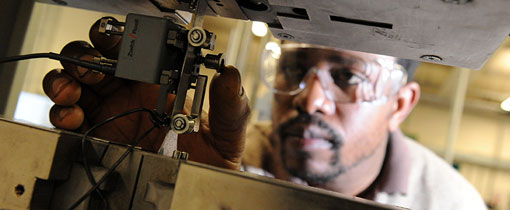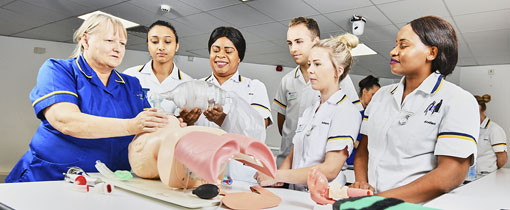
Opportunities for students have been at the heart of our mission for over 190 years.
Based at campuses in Wolverhampton, Walsall and Telford – the site of the new Marches Centre of Excellence for Health and Social Care – the University of Wolverhampton has over 29,400 students and 2,100 staff.
Additionally, the University of Wolverhampton Science Park is home to tenant businesses and supports the development of innovative companies.
The University’s Springfield Campus is a culmination of the most ambitious aspect of the University’s Our Vision, Your Opportunity programme. The site of the former Springfield brewery has been transformed into Europe’s largest specialist construction and built environment campus. It brings together businesses and the education sector to maximise economic impact.
Springfield is the new home of the University’s School of Architecture and Built Environment and National Brownfield Institute. With Thomas Telford University Technical College and Elite Centre for Manufacturing Skills also on-site, this campus is central to our vision of enhancing the student experience and supporting business growth.
Key facts and figures
The University of Wolverhampton received a commendation – the highest possible accolade – in its most recent assessment by the Quality Assurance Agency: the independent body that evaluates standards and quality in UK higher education.

Research at the University of Wolverhampton is world-leading, ground-breaking and life-changing. It informs the teaching and learning we deliver here at Wolverhampton.
REF2021
Our research is at its highest ever level according to the Research Excellence Framework 2021.
75% more staff were submitted for the Research Excellence Framework (REF) 2021 than REF2014.
The results show that more than half of the University’s research is judged as internationally excellent (3) or world-leading (4), in total 93% is internationally recognised.
Sixteen subject areas have research of world-leading standard, including the University’s work on changing perceptions of the Black Country, cybersecurity, autism, intelligent transport systems, Brownfield regeneration, eliminating gender and race discrimination and improving health outcomes for all.

The University was awarded four stars overall in 2023 in the QS Stars ™ scheme – with the highest five stars for teaching, employability, facilities, internationalisation, and inclusiveness.
The QS Stars scheme is a global rating system which assesses the strengths of universities worldwide against several categories.
The University embeds employability into all its programmes to create opportunities and connections for its students.
88% of the University’s UK graduates from the most recent cohort are in work or further study according to the latest Graduate Outcomes Survey (published 2024, Class of 21-22). It also showed almost 52% are in highly skilled roles.

The National Student Survey is completed by final-year university students across the UK and is managed by the Office for Students (OfS).
Student satisfaction at the University of Wolverhampton is above sector average across a number of categories, the latest National Student Survey results show (2024).
- Teaching on my course: 85.6% (above sector)
- Learning opportunities: 82.9% (above sector)
- Assessment and feedback: 81.8% (above sector)
- Listening to the student voice: 74.5%
- Academic support: 79.9%
- Organisation and management: 70%
- Learning resources: 84.9%
[Figures for full-time, first degree students.]
A number of courses achieved an outstanding score of 100% satisfaction by students in response to survey questions: - Fire and Rescue
100% scored for “Academic support” and “Organisation and management” - Football Coaching and Performance
100% scored for “Teaching on my course” and “Organisation and management” - History
100% scored for “Academic support” - Public Health
100% scored for “Organisation and management”
[Figures for all students taught at the university]

Research England’s Knowledge Exchange Framework (KEF) recognises the diverse contributions that universities across the country offer their local areas. The framework aims to increase the efficiency and effectiveness of public funding use for knowledge exchange while aiding continuous improvement in higher education providers. KEF identified the University of Wolverhampton as being in the top 10% nationally for public and community engagement, as well as in the top 10% for local growth and regeneration.

The University of Wolverhampton’s roots go back to the 19th century Wolverhampton Mechanics’ Institutes and School of Art. It offers a broad range of subjects at foundation, undergraduate and postgraduate level – many accredited by prestigious professional bodies. Over 29,400 students studying at teaching campuses in the Midlands and through nationwide partners benefit from innovative and excellent teaching. This QAA-commended university is ranked third in England for social mobility (Higher Education Policy Institute) and boasts world-class research along with an 88% graduate employability rate (Graduate Outcomes Survey 2024).
- Over 29,400 students studying worldwide with the University of Wolverhampton.
- We have students learning with partner institutions in countries including Nepal, India, China and Sri Lanka.
- Over half are aged 21 or older.
- 45% are part-time students.
- 51% come from global majority backgrounds and 38% are white.
- 2/3 of our new students are the first in their family to go to university.
- Our students and alumni come from 130 countries across the globe.
- We help our students to increase and fulfil their potential and move into fulfilling careers.
- No one is left behind at Wolverhampton – we are there to support each student on their academic journey.
- We're ranked third in England for social mobility, and have been in the top 10 for four years running – making higher education accessible for individuals and communities for the first time (Higher Education Policy Institute (HEPI), The Social Mobility Index 2021, 2022, 2023, 2024).
- We've been ranked number 1 in the UK for two years running for teaching first generation students (those who are the first in their family to go to university) by the Daily Mail University Rankings 2024, 2025.
- We've been ranked 6th in England and Wales for social inclusion by The Sunday Times and The Times Good University Guide 2025.
- We have been providing opportunities to students for nearly 200 years and the choice of courses we offer is as diverse as our community.


/prod01/wlvacuk/media/departments/digital-content-and-communications/images-18-19/iStock-163641275.jpg)
/prod01/wlvacuk/media/departments/digital-content-and-communications/images-2024/250630-SciFest-1-group-photo-resized-800x450.png)
/prod01/wlvacuk/media/departments/digital-content-and-communications/images-18-19/210818-Iza-and-Mattia-Resized.jpg)
/prod01/wlvacuk/media/departments/digital-content-and-communications/images/Maria-Serria-(teaser-image).jpg)
/prod01/wlvacuk/media/departments/digital-content-and-communications/images-2024/241014-Cyber4ME-Project-Resized.jpg)
/prod01/wlvacuk/media/departments/digital-content-and-communications/images-18-19/210705-bric_LAND_ATTIC_v2_resized.jpg)
/prod01/wlvacuk/media/images/2019-re-design/blurb-block/students-sat-in-courtyard.jpg)


/prod01/wlvacuk/media/departments/digital-content-and-communications/images-2024/Samantha-Elliott-approved-picture-resized.png)
/prod01/wlvacuk/media/departments/digital-content-and-communications/images-2024/250707-Arts-Connect-Dudley-Hub-delivery-day-resized.png)
/prod01/wlvacuk/media/departments/digital-content-and-communications/submitted-news-images/Law-Alumni-Courtyard.jpg)
/prod01/wlvacuk/media/departments/digital-content-and-communications/images-2024/Lauren-Chandler,-Sales-Office-Manager-at-MyWorkwear-modeling-Hannah-De-Haan's-design-at-the-Shropshire-Chamber-Business-Awards-resized.png)
/prod01/wlvacuk/media/departments/digital-content-and-communications/images-2024/OpenBright-logo-registration.png)
/prod01/wlvacuk/media/departments/digital-content-and-communications/images/stock-images/Walsall-Campus-Samuel-Johnson-Building.png)
/prod01/wlvacuk/media/departments/digital-content-and-communications/images-2024/Dr-Brian-Johnston-Claudia-Novello-and-colleagues-at-the-Syn2025-conference-Cambridge-University.png)
/prod01/wlvacuk/media/departments/digital-content-and-communications/images-2024/Andy-Lane-WLV.jpg)
/prod01/wlvacuk/media/departments/digital-content-and-communications/images-2024/Hannah-Jones-CF-graphic-design-thumbnail.png)
/prod01/wlvacuk/media/departments/digital-content-and-communications/images-2024/Simmi-Sahota-degreeshow-thumbnail.png)
/prod01/wlvacuk/media/departments/digital-content-and-communications/images-2024/Children-of-Ukraine-artwork-painting-1.png)
/prod01/wlvacuk/media/departments/digital-content-and-communications/images-2024/Inclusivity-Conference-teaser-image.jpg)
/prod01/wlvacuk/media/departments/digital-content-and-communications/images-2024/250516-The-Hub-launch-resized.jpg)
/prod01/wlvacuk/media/departments/digital-content-and-communications/images-2024/250520-meet-the-author-Yomi_Adegoke-news-teaser.jpg)
/prod01/wlvacuk/media/departments/digital-content-and-communications/images-2024/250519-satellite-Aurora-Render-Port.jpg)
